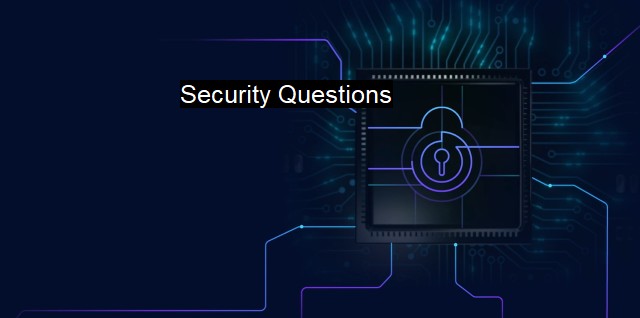What are Security Questions?
The Power of Knowledge-based Authentication: Why Security Questions Remain Essential for Cybersecurity and Confidential Data Protection
Security questions, commonly referred to as secret questions, are tools used in the realm of cybersecurity to protect a user's personal and login details. They serve as an additional layer of security, ensuring only the rightful account holder has access. The idea is that in addition to a password, you answer a question that only you know the answer to, thus making it more difficult for an unauthorized person to gain access to your data or profile. This method of authentication is built on the assumption that an intruder might crack your password, but would likely find it difficult to answer your security question correctly.Security questions are typically unique and personal to the account holder. They range from inquiries about the town in which your first school was located, your maternal grandmother's maiden name, or your favorite fictional character. The answers are often case sensitive and aim to create a barrier for those that do not have authentic insights about the user's life.
While frequently employed within countless digital platforms – such as online banking, social media sites, and online marketplace portals – the value of security questions extends to several cybersecurity measures, including antivirus software. This is particularly useful in cases where malicious elements may attempt to block or override antivirus defenses by penetrating the safety perimeter of a credential-based entry, such as your password. In such a scenario, having a security question acts as an extra hurdle for would-be cyber threats, making intrusion attempts considerably more difficult.
Security questions do not offer infallibility. A significant downside is their vulnerability to phishing attacks – a tactic where fraudsters impersonate a trustworthy entity in order to extract sensitive information directly from the user, thereby bypassing the security benefits that secret questions may otherwise offer. information often used in security questions – like pet names, parent's middle names, or favorite sports teams – can be found publicly. A security-minded individual should, therefore, be cautious in selecting a question and an answer not easily guessable.
Security questions also come under the scrutiny of privacy advocates given the personal nature of the questions. These questions often probe personal areas of an individual's life—areas that people may not feel comfortable sharing, as they can often be sensitive, emotional, or even embarrassing.
Given these inherent limitations, effective usage of security questions necessitates adherence to best practices. Select obscure questions and formulate distinctive, difficult-to-guess answers. rotating your security questions periodically can further enforce security integrity around the protected digital asset.
Security questions, along with other multi-factor authentication strategies, can be highly effective in deterring unauthorized access provided they are sufficiently obscure and change periodically. They serve as pertinent and effective tools within the extensive realms of cybersecurity and antivirus software where they perform a significant role, creating a safer, more secure cyberspace. Together with other security features like antiviruses, firewalls, and encrypted networks, security questions build a robust defense line against cyber threats and attacks.

Security Questions FAQs
Why are security questions important?
Security questions are important because they help verify the identity of a user and provide an additional layer of security for online accounts. This makes it more difficult for hackers to gain access to sensitive information.What are some common security questions used for password recovery?
Common security questions include questions about a person's favorite color, pet's name, high school name or mascot, and mother's maiden name. However, these questions are becoming less popular as they can be easily guessed or found on social media.Should I use the same security questions for multiple accounts?
No, you should not use the same security questions for multiple accounts. Using unique security questions for each account provides an extra layer of security and makes it more difficult for hackers to gain access to multiple accounts.How can I create strong security questions?
To create strong security questions, choose questions that only you would know the answer to and that cannot be easily guessed or found on social media. You can also use a random question generator to create unique questions. Just make sure to keep track of your answers in a secure location.| | A | | | B | | | C | | | D | | | E | | | F | | | G | | | H | | | I | | | J | | | K | | | L | | | M | |
| | N | | | O | | | P | | | Q | | | R | | | S | | | T | | | U | | | V | | | W | | | X | | | Y | | | Z | |
| | 1 | | | 2 | | | 3 | | | 4 | | | 7 | | | 8 | | |||||||